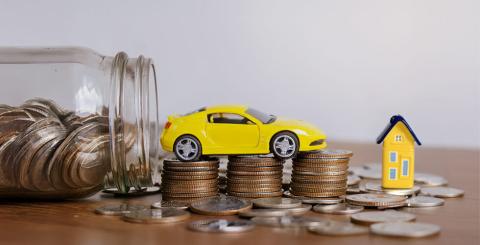Lithium-ion batteries: Safety tips

Increasing numbers of everyday objects, from watches to toys to hearing aids, contain lithium-ion batteries, and many people are wondering (with good reason) whether they’re safe. Residential and commercial fires caused by broken or overheated lithium-ion battery–powered devices may not be common, but they are on the rise. To help protect your family and home from these risks, here’s what you need to know about these omnipresent batteries.
Origins of the lithium-ion battery
Since their invention in the 1970s, lithium-ion batteries have become indispensable to us all. Initial prototypes were unstable and unsafe, so they saw limited use. More than 20 years of research has resulted in a safer version—lithium-ion batteries—which were widely commercialized in the consumer electronics sector in the 2000s. Since then, the technology has continued to improve and be more widely used, particularly in electric vehicles and portable electronic devices.
Battery-powered devices in your home
Lithium-ion batteries are now found in much more than electronic devices and electric-powered transportation. They are just about everywhere:
- Scooters, bicycles, and electric cars
- Phones and laptops
- Hearing aids
- Solar panels
- Cameras
- Drones with cameras
- Watches
- Toys
- Portable chargers
- Vaping products
- And more
How do lithium-ion batteries work?
A lithium-ion battery consists of several individual batteries (called cells) connected to each other. Each cell has three main components: a positive electrode (cathode), a negative electrode (anode), and a liquid electrolyte. The battery absorbs and releases energy by circulating electrons, creating a difference in potential between the anode and cathode, which are immersed in the electrolyte (the conductive fluid).
Good to know: Unusual or harsh operating conditions (overload, short circuit, external heat source, etc.) can cause extreme temperature increases in a cell. If the cell cannot adequately dissipate the heat produced, the chemical reactions accelerate. This can lead to thermal runaway. Since batteries are not good at dissipating heat, they are highly prone to thermal runaway, which can cause fires or explosions.
Damaged or misused batteries: Beware!
Lithium-ion batteries present little danger when they’re manufactured according to standards, in good condition, and used according to manufacturer instructions. But when they’re damaged or misused, the opposite is true. Damaged or non-functional lithium-ion batteries pose a risk of overheating, short-circuiting, catching fire, and exploding.
To prevent these hazards, you need to know the signs of a non-functional lithium-ion battery. What are they? A new or used battery is damaged if it appears deformed, swollen, punctured, or is leaking electrolyte. It may even give off an unusual smell or smoke. Damage is not always visible and is usually caused by a shock, fall, or thermal exposure. If a lithium-ion battery–powered device falls on the ground, hits something hard, is struck by a vehicle, or overheats, you need to check the battery.
Misusing a lithium-ion battery (e.g., not charging it properly) can also pose a risk of overcharging and fire, so it’s important to follow manufacturer instructions and only use accessories provided with the device.
Fires caused by lithium-ion batteries on the rise
According to the activity report of Service de sécurité incendie de Montréal (SIM), 24 lithium-ion battery fires occurred in 2022, 3.5 times more than in 2021. In Québec City, firefighters reported a sevenfold increase in fires caused by lithium-ion batteries from 2021 to 2022. As increasing numbers of lithium-ion battery–powered devices enter daily use, we can expect such incidents to snowball over the next few years.
Preventing lithium-ion battery hazards
Prevention is key to reducing the risk of fire due to the breakage of overheating of a lithium-ion battery–powered device. Health Canada’s recommendations to prevent overheating and fire hazards include the following dos and don'ts:
Do:
- Only use the charger provided with your device. If you need to replace the charger, buy a one that is approved by the device manufacturer
- Only use chargers bearing certification marks recognized in Canada
- Handle lithium-ion batteries with care. Don’t throw, drop, modify, or tamper with them
- Store batteries in a dry place at room temperature out of the reach of children
- Recharge your devices in a ventilated area at room temperature away from any door that could serve as a fire escape exit
- When carrying batteries, keep them in a protective, non-metallic case
- Recharge and store batteries away from flammable objects and surfaces if you don’t use them frequently
Don’t:
- Recharge your batteries longer than the recommended time
- Recharge batteries that are either warmer than room temperature or below freezing
- Buy batteries from unknown sources or of unknown quality, as they may not be certified
- Leave a device charging unattended or in a closed-off area
- Do not use batteries if:
- They are bulging or dented
- The plastic packaging is torn
- There are any other signs of wear or breakage
- Do not dispose of non-functioning or broken batteries in the garbage. Your municipality can direct you to ecocentres where you can dispose of them.
For more hazard prevention and safety tips for using and storing your lithium-ion battery–powered devices, visit the Government of Canada web page Battery safety: Lithium-ion batteries.
Home insurance: Your essential defence against fires
Even if you do everything you can to prevent lithium-ion battery fire hazards, incidents can still happen. Fortunately, home insurance covers your home, outbuildings (such as the garage or shed), personal property, and third-party liability for damage caused by a fire. Home insurance protects you from accidental damage caused by a damaged lithium-ion battery, whether you are a homeowner, co-owner, or tenant.
Promutuel Insurance, THERE to protect you from fire!
For over 170 years, Quebecers have trusted us to protect their families and homes from fire and all sorts of other disasters and unfortunate events. Join them and get home insurance tailored to your needs at a great price.
Get a quote online in just four minutes now!



